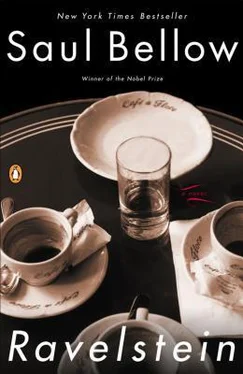"Didn't you?" said Rosamund.
"Sure, but he wouldn't want it to just drag on. In the hospital he'll have more protection from friends and well-wishers."
"He's far more sociable than you, Chick. He enjoys company."
It was not merely a matter of company. People brought their problems to him as well, as if from his deathbed you could expect something approaching divine information.
The door to Ravelstein's bedroom stood open and I could see our friend Battle's long back-hair resting on his mountainous shoulders, and his natty, ankle-high boots. I didn't have his face fully before me but his wife was evidently crying. She was bent forward. Those couldn't have been anything but tears. I had great respect for Mrs. Battle and was very fond of her husband.
The Battles were Ravelstein fans. They never attended his public lectures and I doubt they read his books, but they took him very seriously. When Battle retired some years ago, he and his wife moved across the state line into the Wisconsin woods, living very simply, а la Thoreau. When they were in town Ravelstein liked to dine with them at our Serbian-French club.
I had made the discovery that if you put people in a comic light they became more likable-if you spoke of someone as a gross, belching, wall-eyed human pike you got along much better with him, thereafter partly because you were aware that you were the sadist who took away his human attributes. Also, having done him some metaphorical violence, you owed him special consideration.
After they had gone Ravelstein said to me (he was coiled up with some internal amusement) that the purpose of their visit was to get his advice.
"About what?"
"They came to talk to me about their suicide plans. They apologized for troubling me. At such a time…"
"I should think so," I said.
"Don't be too hard on them, Chick. With older people suicide fantasies are common enough. I think they were serious."
"They thought they were being serious."
"Because I'm dying I had the same thought, naturally. This is a hell of a time for people to be bringing me their problems. They put it in the 'just suppose' form. Did I think that in the abstract, at their time of life, and all the rest of it, they would be well advised…?"
"A suicide pact?"
"Battle made the argument and she filled it out and added the sensible comment. They said I was the only person they trusted enough and who wouldn't be satirical with them."
"So you come to a man who would rather not die and you put your case for suicide to him."
"Battle has been hinting at it for weeks. He's a very intelligent per son, but he has too much character to overcome. His character makes him inarticulate. She's the more sensible one, and she came wearing a plain blue suit with rows of buttons down the front. She's a little thing. Or is it the supersized husband that makes her look tiny? Anyway, she has a pretty, upward-looking small Brit face. I think that when kids look at her they must see a lovely, sympathetic face…."
"So what's their complaint?"
"The complaint is that they're getting old. All educated people make the same mistake-they think that nature and solitude are good for them. Nature and solitude are poison," said Ravelstein. "Poor Battle and his wife are depressed by the woods. That's the first observation to be made."
"What did you tell them?"
"I said they had done right to take it up with me. More people should get advice when they're suicidal. They feel that way because there's no community, no one to talk to."
"Maybe it's their idea of a tribute-as if they were saying that life without their friend Ravelstein would lose its value," I said.
"Well, they're dear people," said Ravelstein. "They dreamed up this occult way of letting me know that I didn't have to go it alone."
"Obviously they talk about you all the time, and you may have become their absent referee."
"So that if I died they might as well be dead, too," said Ravelstein, but this was his way of making light of the subject. He loved gossip but the interest he took in people would be hard to describe. He had a curious intuitive ability but with him it wasn't so much analysis as it was divination that you sensed when he talked about personalities, or groped them out.
"What I said was that it was a mistake to make suicide a matter of argument or debate. To reason for or against life is kid stuff."
"You have great authority with both of the Battles, and if you said don't do it, they wouldn't do it."
"That's not my style, Chick, to lay down the law."
This was certainly untrue.
"They wanted to be taken seriously," he said. "But of course they weren't. They wanted to amuse me with their double-suicide routine."
That was more like it.
"I told them they had had a great love affair. A classic."
"And they shouldn't bring love into disrepute," I said.
"Something like that," said Ravelstein. "You've heard the story. After one dance with Battle, whom she had never met before, she left her husband. She stepped into Battle's arms and that was that. In that same instant, both parties recognized that their respective marriages were ended…. He was strong on the tennis court and on the dance floor but he was no seducer, and she was not an unfaithful wife. He said he would be waiting for her at the airport…
"Where was that again?"
"In Brazil. And they've had a happy life."
"I remember now. Their plane was struck by lightning. They had to land in Uruguay. So for many years they were together-forty years without a letdown. The Battles count on me to summarize things, so I obliged and told them their own story. Among millions or hundreds of millions of people they alone lucked out. They had a great love affair and decades of effortless happiness. Each amused the other with his or her eccentricities. How could they bear to cheapen it with a suicide…? I could see that Mrs. Battle was hearing what she hoped to hear. She wanted me to make the case for continuing to live."
"But Battle was not completely satisfied-is that it?"
"That's right, Chick. He wanted a discussion about suicide and nihilism. I've often thought that suicide fantasies and murder fantasies balance each other in the mental economy of civilized people. Battle's not a professor through and through, but he feels a responsibility to square himself with nihilism. He doesn't know much about nihilism but it's in the air. He said something about successful people being prone to suicide-seeing through the illusions of success and doing away with themselves…"
"If you dislike existence then death is your release. You can call this nihilism, if you like."
"Yes. American-style-without the abyss," said Ravelstein. "But the Jews feel that the world was created for each and every one of us, and when you destroy a human life you destroy an entire world-the world as it existed for that person."
All at once Ravelstein was annoyed with me. At least he was speaking with an angry emphasis. Perhaps I was still smiling at the Battles and it might have seemed to him that I was dissociating myself from the view that you destroyed an entire world when you destroyed yourself. As if I would threaten to destroy a world-I who lived to see the phenomena, who believe that the heart of things is shown in the surface of those things. I always said-in answering Ravelstein's question "What do you imagine death will be like?" — "The pictures will stop." Meaning, again, that in the surface of things you saw the heart of things.
To the end, Ravelstein attracted lots of visitors. Few reached his bedroom-Nikki saw to that. But among those who mattered was Sam Pargiter, whose presence was oddly significant. He was one of my close friends. Through me he had read Abe's famous book and attended his public lectures and came also to some of our joint seminars. He highly valued Ravelstein's opinions and his jokes. With a large _No Smoking__ sign behind him, Ravelstein lit cigarettes with his Dunhill flame as he lectured, saying, "If you leave because you hate tobacco more than you love ideas, you won't be missed." He said this with such comic sharpness and good nature that Pargiter then and there fell in love with him and asked me to introduce him to this witty man. I told Ravelstein that my friend Sam Pargiter wanted to meet him.
Читать дальше












